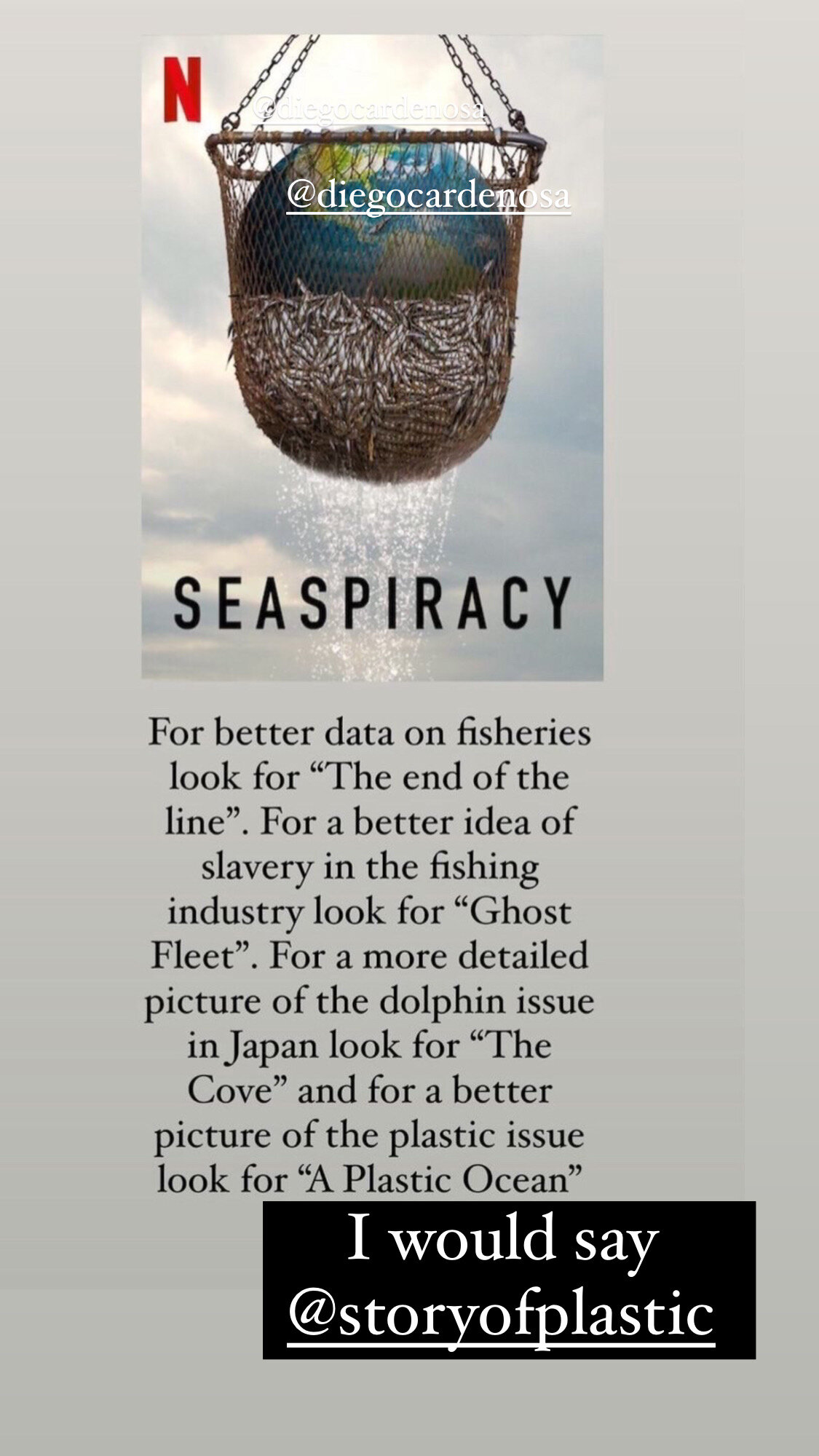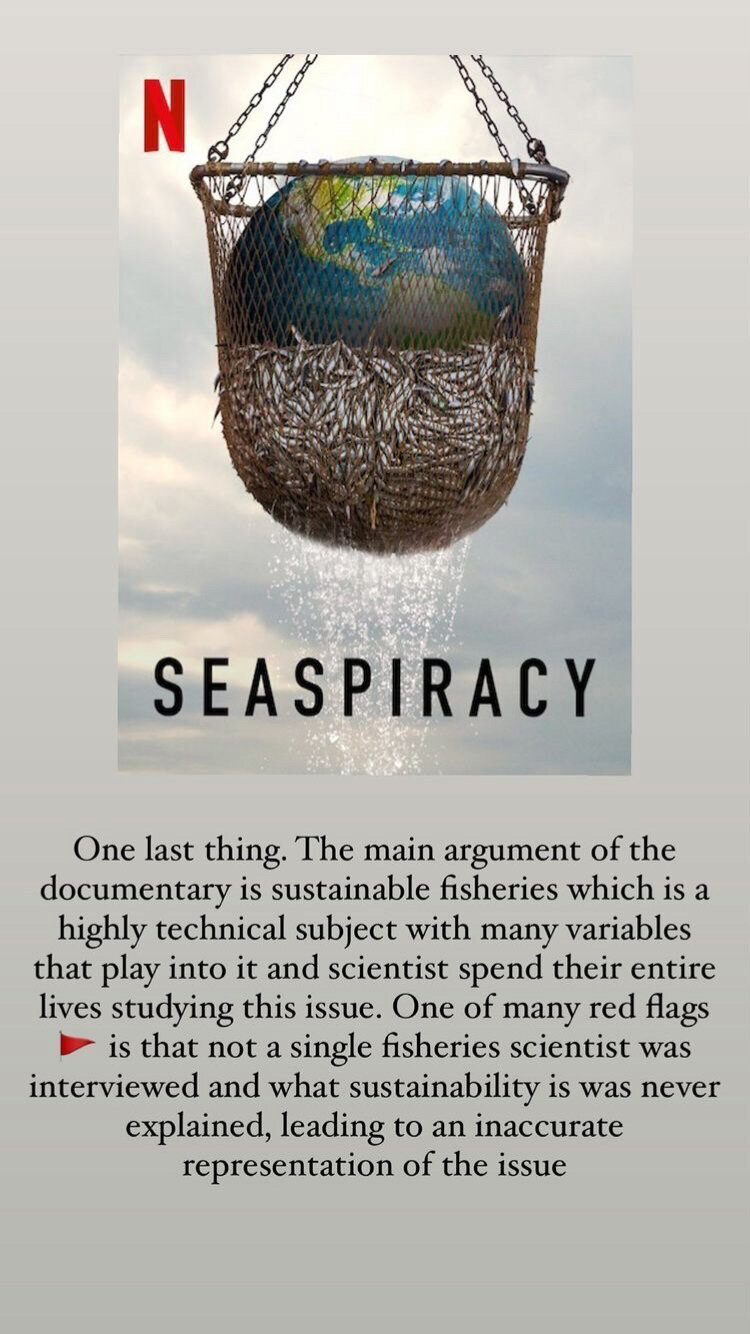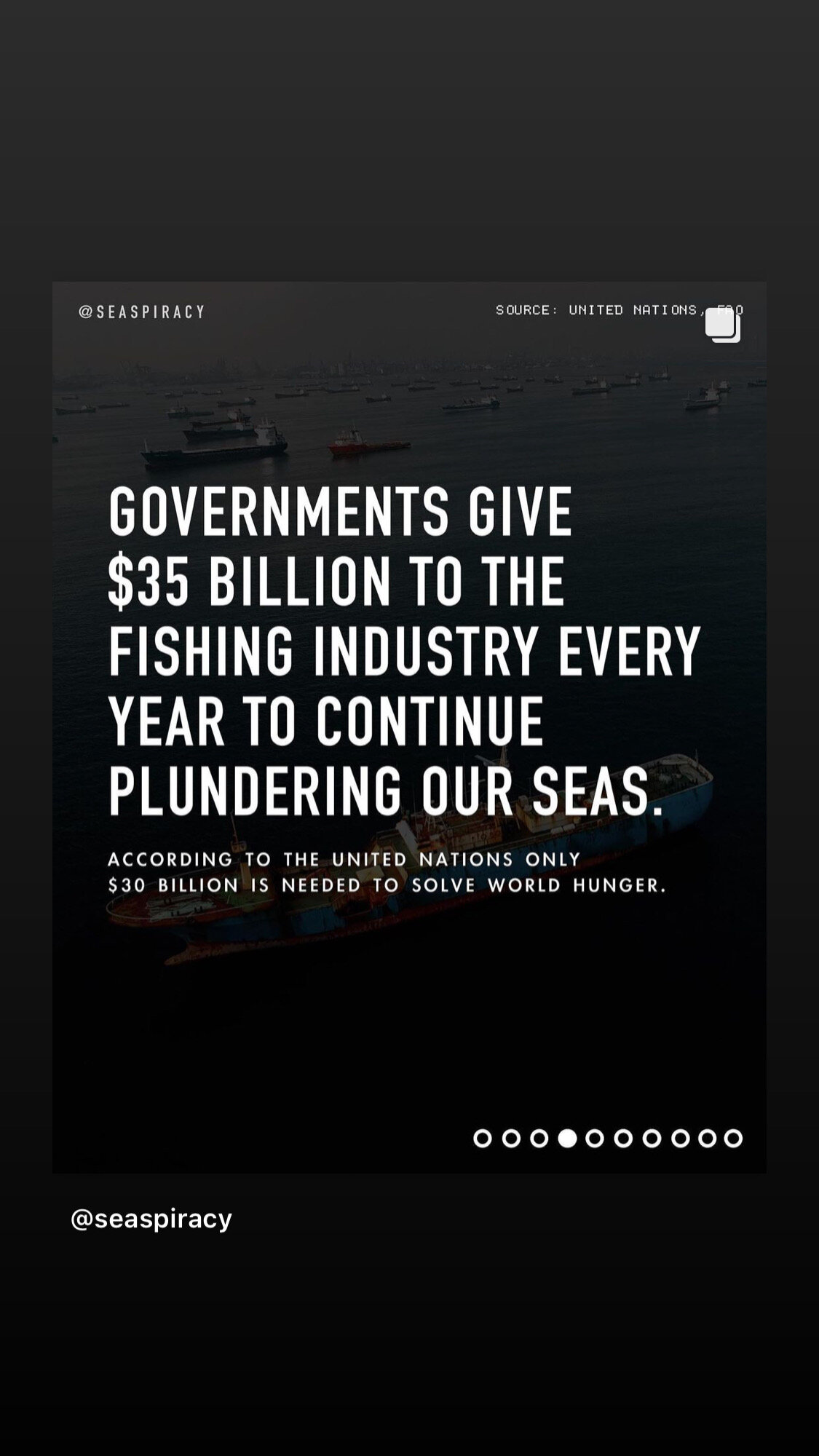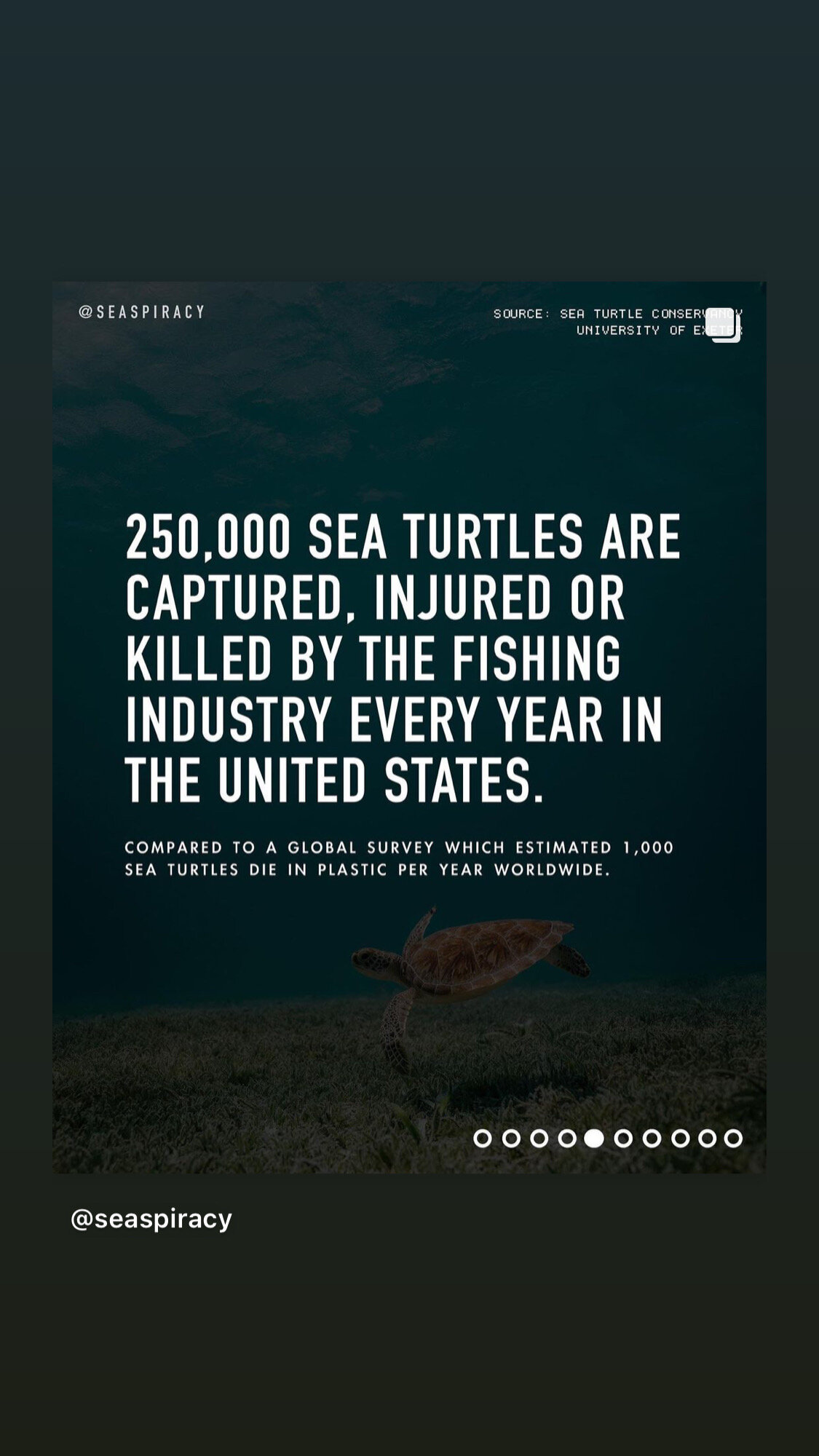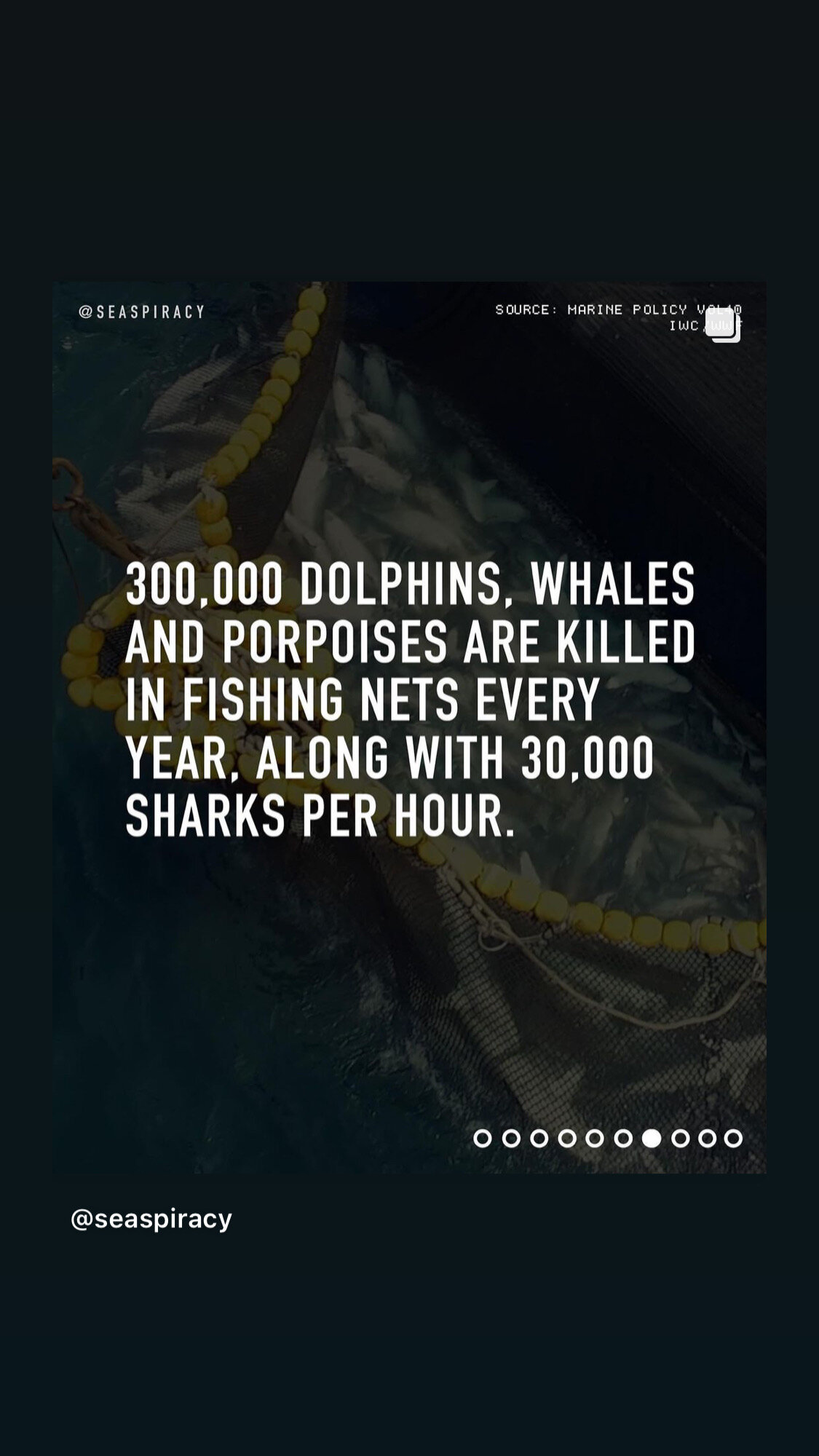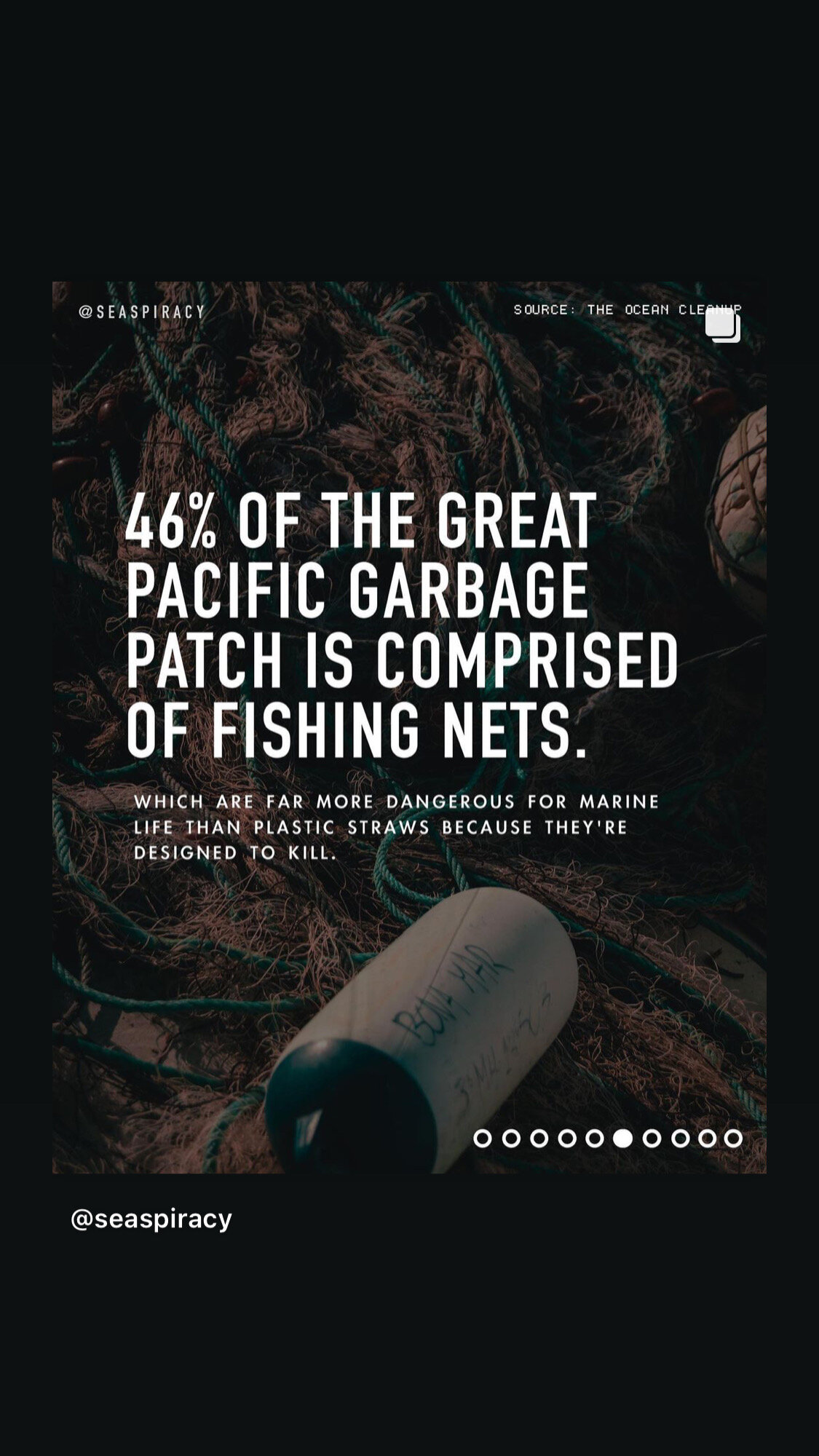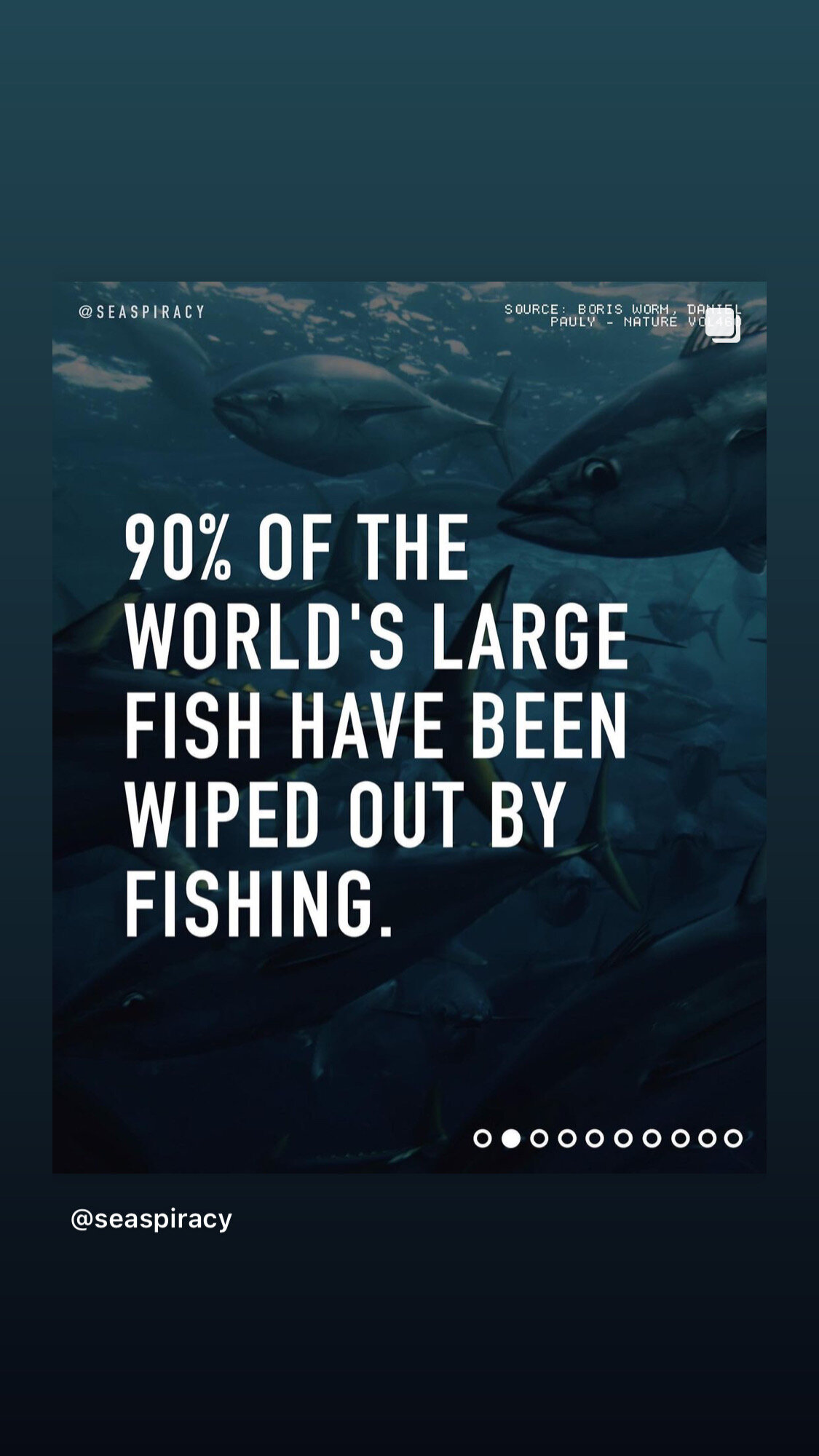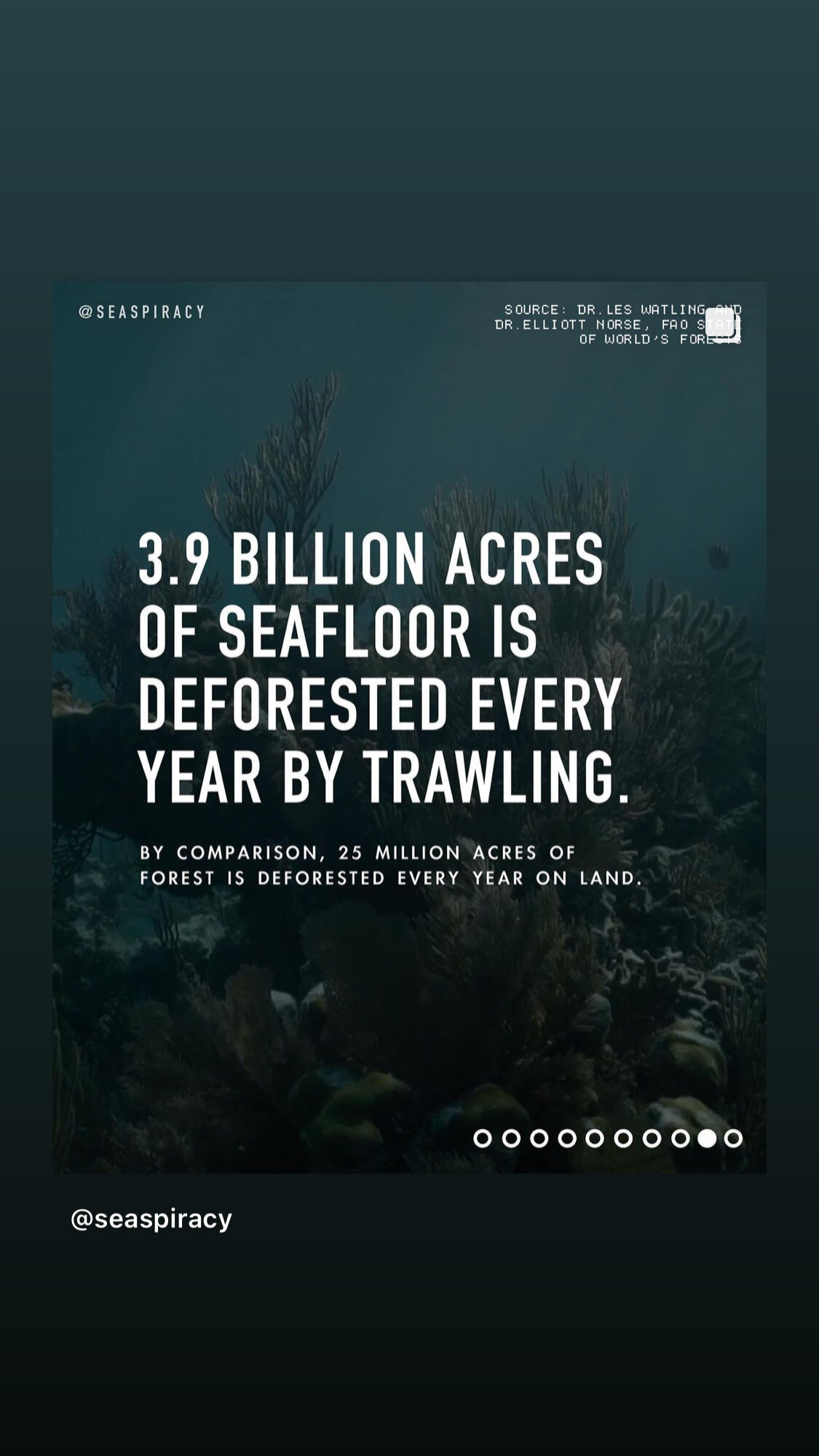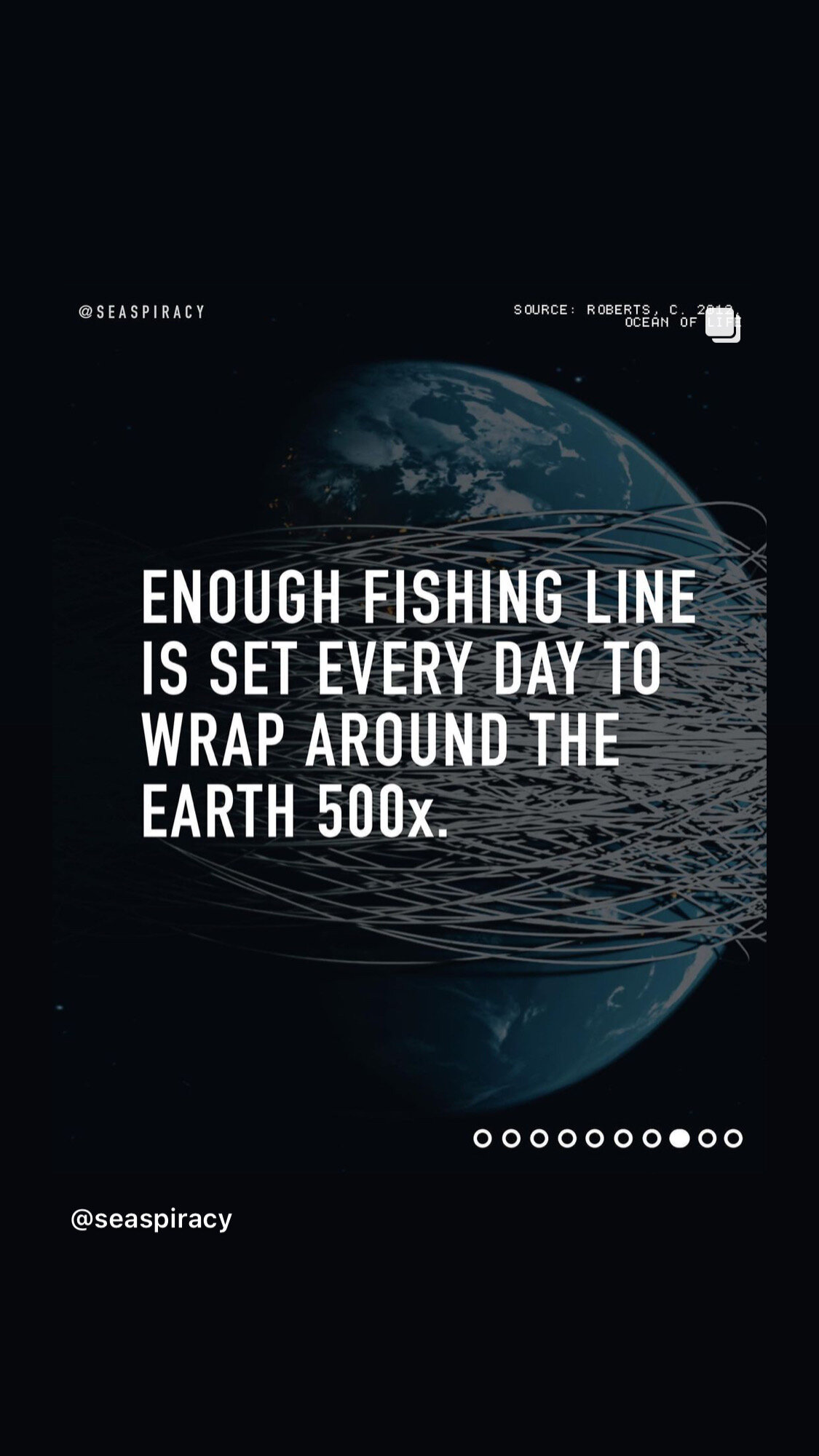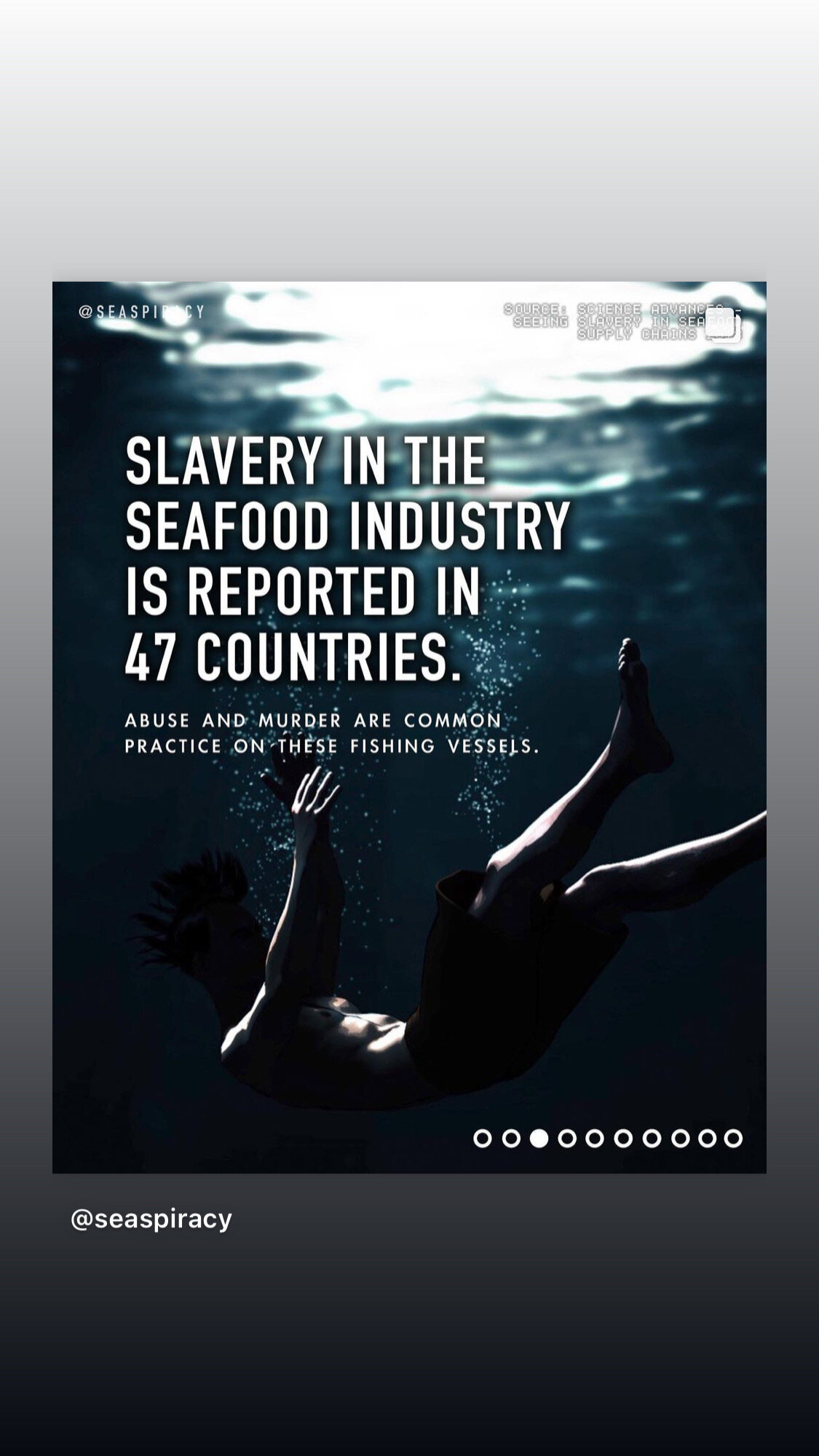Seaspiracy: LOVED the message, HATED the method
Watched SEASPIRACY last night. Loved and hated it, to be honest. Had a few loves lined up next to hundreds of hates comprised of cringey, nonfactual, misguided claims and damning interviews I thought sacrificed diligence for drama. Overall, the message to quit seafood is a good one; the road to get there was sloppy and hard to watch.
HATED:
The shocking vilification of hard working plastics organisations that have been slogging it out for ecological justice long before the filmmaker was born.
DIVISION IN THE MOVEMENT
I have a big problem with the tactic to try to catch and call out hard working activists who have been working on this issue for decades. I’m friends with these people and their work has paved the way for this man to come in and make a film about this issue. Plastic Pollution Coalition is not the enemy, here. The fishing industry is. Why create division & mistrust within an already under funded overworked movement?
My friends at Plastic Pollution Coalition & at most of these orgs listed are good people spending their time on this planet to do their best for the oceans. This documentary hurt them and they don’t deserve to be called out for a blind spot that they were unprepared to address. Clearly the film maker was trying to create drama in trying to catch them addressing micro plastics as opposed to discarded fishing gear & ghost nets. Which eventually break up and become micro plastics.
INACCURRATE
TO QUOTE Plastic Pollution Coalition on this issue:
The film misrepresented the ocean plastic pollution crisis to suit the filmmakers’ agenda. The film claimed 48 percent of ocean plastic consists of fishing nets, while not including the fact that this came from a study of one ocean gyre. In fact, fishing gear represents 10 percent of ocean plastic overall, according to a Greenpeace report.
Less than 5 percent of all the plastic produced ends up in the ocean. Globally about 350 million tons of plastic is produced every year, and about 10 million tons end up in the ocean every year. Plastic pollutes across its lifecycle, from extraction of the fossil fuels, to use, and disposal (whether ending up in the ocean or our environment).
MISGUIDED
I don’t think anyone denies the fact that fishing gear makes up a huge, alarming percentage of ocean plastics, we have had that data for years. (WWF, Greenpeace Report, Sea Shepherd) The many crises facing our oceans are hugely overwhelming, complicated, multifaceted issues. And the humans working on them should be supported and respected (and funded!) not shamed for focusing on a different issue than what your current pet issue is.
In the ocean conservation family, Sea Shepherd has stepped up to go to war with illegal fishing. The plastics crises is so bloody complicated, I myself have even been paralysed with overwhelm multiple times in my career unable to choose a specific direction even within the “narrow” environmental focus of “plastics.” This is precisely why the Break Free From Plastic Alliance was created to unite all of the organisations working on plastics to address all stages of the plastic crisis! From ultra polluting oil extraction, to hazardous production, to irresponsible packaging & distribution, to discarded plastic waste, to ocean pollution, to micro plastics, to endocrine disruption in humans.
STRAWS
YES, straws represent only 0.03% of ocean pollution. And pretty sure straws represent approximately 0.03% of most ocean conservation campaigning efforts. It’s not a big focus.
Imagine our horror & frustration when STRAWS are what the media, general public, & governments picked up on & decided to ban. It’s because people are lazy & wanted an easy win. Hence why The Ocean Cleanup got funded": “Yay, we can just scoop up all the plastic in the ocean!” Y’all know that failed right? (Feel free to comment any questions) It’s not that easy to scoop up all the plastics in the ocean. Why? Because they break UP into micro plastics! Fishing gear included.
We cringed at the straw bans. No one needs a straw anyways. It’s low hanging fruit. A painless “sacrifice” for the oil and plastics industry that makes everyone feel like they are saving the turtles, the ocean, the world. **EYE ROLL** (reminiscent of the recycling initiative! Another product of oil industry) I’m over here trying to teach y’all to make toothpaste & “bring your own cup,” because that is the content you want when I poll you and what tracks well in my post insights. And my soul dies a bit. When I talk about my interviews with fishing net recyclers or ask for support to engage with calling out corporations whom are actually responsible for making our only consumer options single-use plastics, these posts get less love. My literal business model is currently asking businesses to pay me to create marketing and promotional content, so that I have the time to also work for these frontline activists and non-profits, because it is that hard to get media coverage or public interest on the actual work required. This is why I get so offended when businesses ask me to work for free to help them sell their for-profit product or service (cough, Zero co.). It’s hard work trying to find that balance between what sells & what is actually needed to make big, lasting change in our world.
SO why straws? Straws are easy to relate to. Kind of like when we freak out about climate change and don’t have a tangible, relatable solution within our grasp to help ease the panic, until we learn about changing our diet. To totally stop eating animal products is a big amazing step we can take for the climate. This is why I stopped using plastics entirely, it’s extreme, it’s impactful, it’s necessary. Quitting straws is like knowing that all animal agriculture is horrendous for the planet and just quitting bacon. No one in the plastic movement is hoping to just focus on straws. It’s an entry point for people to learn about ALL plastic waste.
Building awareness to create behaviour change is a journey. This film will help immensely with informing people how interconnected our global eco systems are, from fishing our planet’s oceans empty to the unknown sources of fish on plates around the world. We have to do more than our individual part. We must act individually AND collectively. That means individually making sacrifices like quitting ALL plastics and quitting ALL seafood and perhaps ALL animal products. AND also being here for the collective actions of holding big corporations accountable—which often means supporting the non profit organisations that are taking on these goliaths. Whether it’s Plastic Pollution Coalition meeting with Nestle to put the pressure on changing their packaging or Greenpeace publicly dumping all of Unilever’s branded single-use plastic trash that washes up in Southeast Asia on the doorstep of their corporate headquarters or Sea Shepherd that is literally at war with the fishing industry slave drivers and pirates. It’s all important. It all needs support. It all could be twisted to look wrong, not be doing enough, not have the “right” focus.
PRIVILEGE
These issues are so complicated. It’s so frustrating as a pleb, trying to work out what is right and wrong. It is tempting to trust a well-produced, two hour film to sum it up for us. But if we watch closely with a critical eye—which we should always do with all media—we will start to see the holes in his argument. Overall, yes! Stop eating fish, animals, using plastic—AND if you’re doing this, pause to check your privilege.
I spend my college days studying environmental ethics and moral responsibility. When should we act for the greater good and when should we act for self preservation? This philosophical inquiry led me to sacrifice the convenience of plastics for the greater good of the oceans. I felt so good living for something bigger than myself and felt the urgency that most young activists feel to convert everyone I knew. And then I learned how shitty I looked telling people to stop using plastics when that was their only option.
Only in the past three to four years have I learned how privileged I am to be able to give up something so ubiquitous as plastics. If we are so privileged to have the option to give up meat or fish, then I truly feel we have the moral responsibility to do so. AND we should never pressure anyone else to make such an extreme lifestyle change because we do not know their nutritional needs or financial situation or cultural beliefs.
This is when collective action is important. To get ACTIVE in the campaigns to end whaling, better monitor and shut down illegal fishing, support testing and improving aquaculture, invest in seaweed and algae alternatives, etc. We can and should do this because we have privilege and thus responsibility.
It doesn’t mean it is easy for us. It doesn’t make the solutions obvious. And I recognise we all mess up A LOT on the learning journey. So I have compassion for these filmmakers. I wonder if they will have the grace and humility to acknowledge their errors and slander.
SENSATIONALISM
It is hard to trust the research and other shocking points made in this film, knowing what I know about the plastics movement and watching how the filmmaker vilified organisations and misrepresented facts to create drama for his film. After speaking to many scientists, I learn that the misguided points on plastics were not alone.
There were many inaccurate messages and sloppy links made between captivity and fishing, competition within the food webs, shark fishing, over generalisations on by-catch negligence, seafood trade, fisheries and fishing never able to be sustainable, fishing and ebola (??), vilification of aquaculture in a malnourished, overpopulated world, and so many other conclusions drawn without supporting evidence or intersectional sensitivity or acknowledgement. The coverage was very limited, rarely acknowledging the efforts made organisations to reduce by catch, improve aquaculture, adapt their monitoring to fit adapting corruption, or giving interviewees the opportunity to correct the twisted quotes used in the narrative to build drama. Again, I hope the filmmakers can right some of the mess they made and harm they caused. It is already so difficult to get traction for environmental issues, the last thing any organisation or activist needs is for the public to question their integrity from a film made with the same intention for oceanic preservation that they have. It is really unfortunate and I will do all I can to help clear up confusion.
LOVED
I do appreciate the damning spotlight on the corrupt, dangerous, illegal, super destructive fishing industry.
STOP EATING FISH
I stopped eating fish years ago, not bc I didn’t like the taste of “seafood” but bc I couldn’t trust where it came from. Waitstaff at restaurants didn’t know, chefs didn’t know, markets didn’t know, suppliers didn’t know! Fishing boats go out to sea, do god knows what to bring home product, sell it with who knows what lies attached about how & where it was caught. I knew enough to have to rule it ALL out.
If all we get from this is to not trust seafood and to stop eating fish, then I agree that’s a point we should all take.
RELATABLE FRUSTRATIONS
I think we could all relate to his strategic emotional journey. And yet this expose of his frustration didn’t inspire him to reflect on the frustration experienced by scientists, activists, ocean lovers, animal lovers, the world over. It didn’t inspire him to retract his damning footage of humans doing their best with the shitty options they have after pushing their entire lives for change. His frustration with Japanese corruption, with danish whalers, with scottish salmon farmers—most of us have felt this same frustration.
I felt it when I worked for three years on plastic ban legislation in California and a weak ban on thin plastic bags passed that allowed for thicker plastic bags to circulate legally. I felt it when people latched on to banning straws and I got pummelled with requests to promote hundreds of reusable straw companies—another THING that people will buy that has to get produced and likely packaged in plastic to get shipped around the world. I felt it when the ocean cleanup received MILLIONS in funding only to launch a boom that travelled slower than the ocean currents and couldn’t collect any plastic trash at sea. I feel it when I see oil and plastics subsidised and paid for with our tax money, knowing I am paying for the very pollution I am fighting against. I feel it when I see imported produce cheaper than local produce, more of this corrupt subsidising of overseas goods he described. I felt it when I watched this film that tried to simplify ALL environmental issues that people are spending lifetimes trying to understand and solve gets simplified down to one or two takeaways and in the process damn so much tireless work.
CATCH or QUIT
I agree to not trust seafood companies and to stop eating seafood if you cannot go catch a fish yourself once in a while. But not one single fisheries scientist was interviewed for this film about the fishing industry. I guess we have to take a deep breath and appreciate the ocean crises exposure, as they say any press is good press.
Thanks for tuning in.

